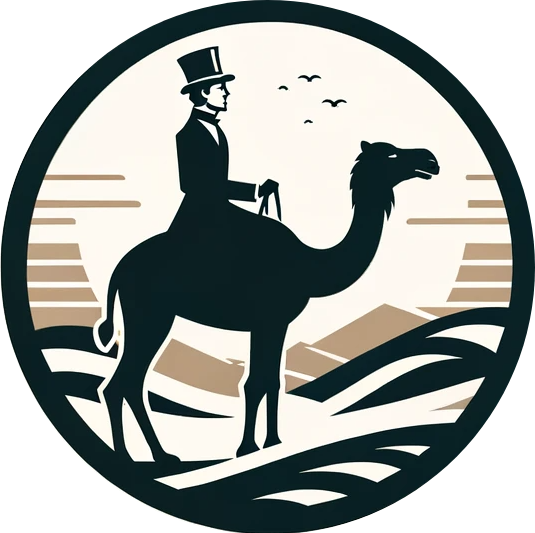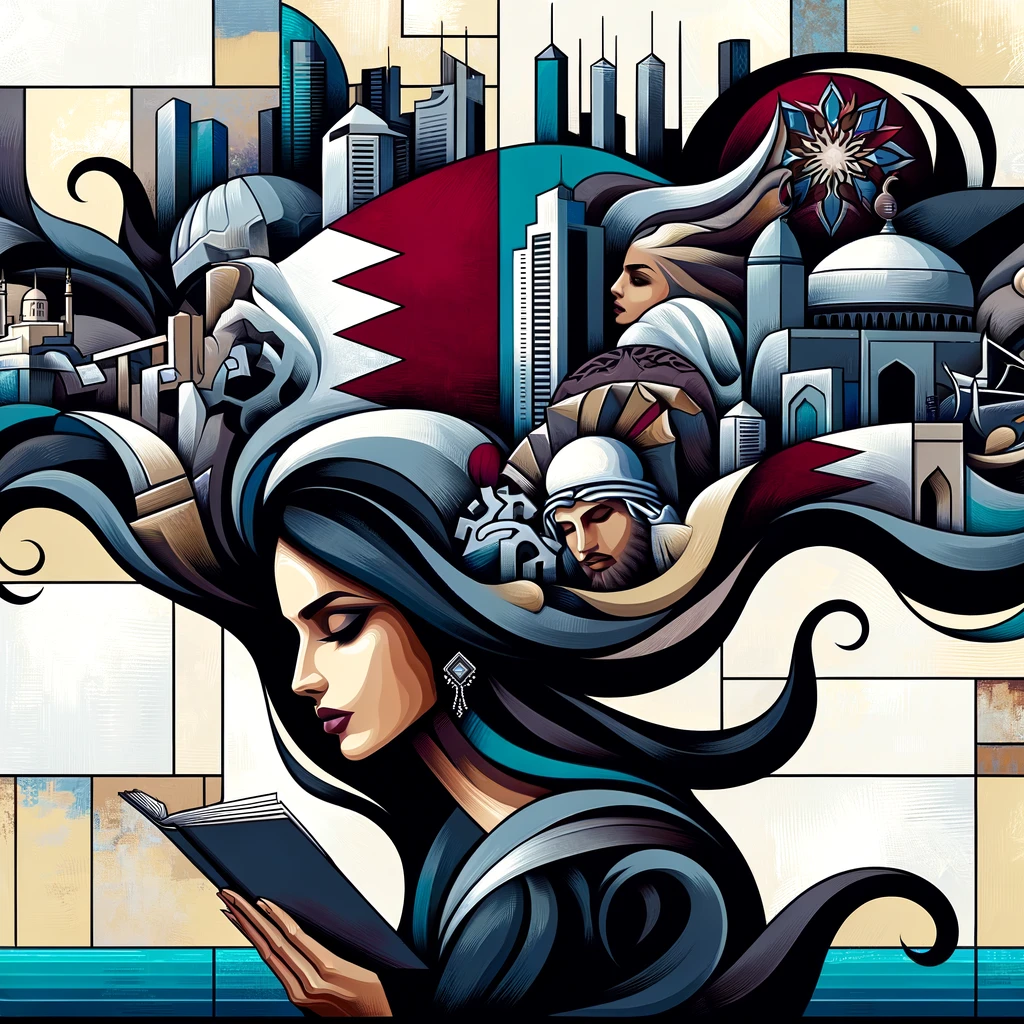Bahrain, a small island nation in the Persian Gulf, has a rich cultural tapestry woven through centuries of history. From its early days as part of the Dilmun civilization, a trading post that connected ancient worlds, to its modern status as a vibrant financial hub, Bahrain has always been a place of cultural confluence. This diverse heritage is vividly reflected in its literature, which encompasses a wide range of voices and themes, from the oral traditions of the ancient past to the dynamic and often politically charged writings of today. Key figures in this literary landscape include Qassim Haddad, renowned for his innovative Arabic poetry; Ali Al Jallawi, a vocal critic of political repression; Ayat Al-Qurmezi, who emerged as a symbol of resistance during the 2011 protests; Lulwa Al Mansouri, a storyteller of Bahraini society; Muneera Swar, exploring themes of identity in a globalized context; and Ebrahim Al Arrayedh, a pioneer of Bahraini poetry. These authors, among others, have played pivotal roles in shaping the narrative of Bahraini literature, making it an essential lens through which to understand the nation’s identity, struggles, and aspirations.
- Qassim Haddad and Ali Al Jallawi are pivotal figures who have used literature to explore themes of love, freedom, and political dissent.
- Ayat Al-Qurmezi became a symbol of resistance with her poetry during the 2011 protests, highlighting the power of words in the fight for democracy and human rights.
- Censorship and suppression of free expression remain significant challenges for Bahraini authors, impacting the dissemination and creation of literary works.
- The tension between tradition and modernity is a recurring theme, reflecting the societal changes and challenges within Bahrain.
- Bahraini literature serves as a mirror to society, offering insights into the complexities, aspirations, and ongoing dialogues about identity and freedom.
Historical and Cultural Context of Bahraini Literature
The literary tradition of Bahrain is deeply entwined with its historical and cultural fabric. The Dilmun civilization, one of the oldest in the Gulf region, laid the early foundations of Bahraini culture with its rich mythologies and trade narratives, positioning the islands as a beacon of ancient storytelling. This early civilisation’s significance is immortalised in texts such as the Epic of Gilgamesh, which celebrates Dilmun as a land of immortality and lush gardens, a testament to Bahrain’s mythological importance in ancient times.
The 20th century marked a renaissance in Bahraini literature, spurred by the country’s rapid socioeconomic changes following the discovery of oil and the expansion of education. The establishment of the Bahrain Writers Association in the 1960s represented a watershed moment, catalysing a vibrant literary movement that sought to articulate the Bahraini experience in a rapidly modernising world. This period saw an efflorescence of poetry, short stories, and novels that grappled with themes of identity, change, and the tensions between tradition and modernity.
This historical backdrop set the stage for a rich tapestry of literary expression, providing Bahraini writers with a deep well of cultural and historical narratives to draw upon. The evolution of literature in Bahrain reflects the nation’s journey through the ages, mirroring its transformations and the ever-present dialogue between its past and its present.
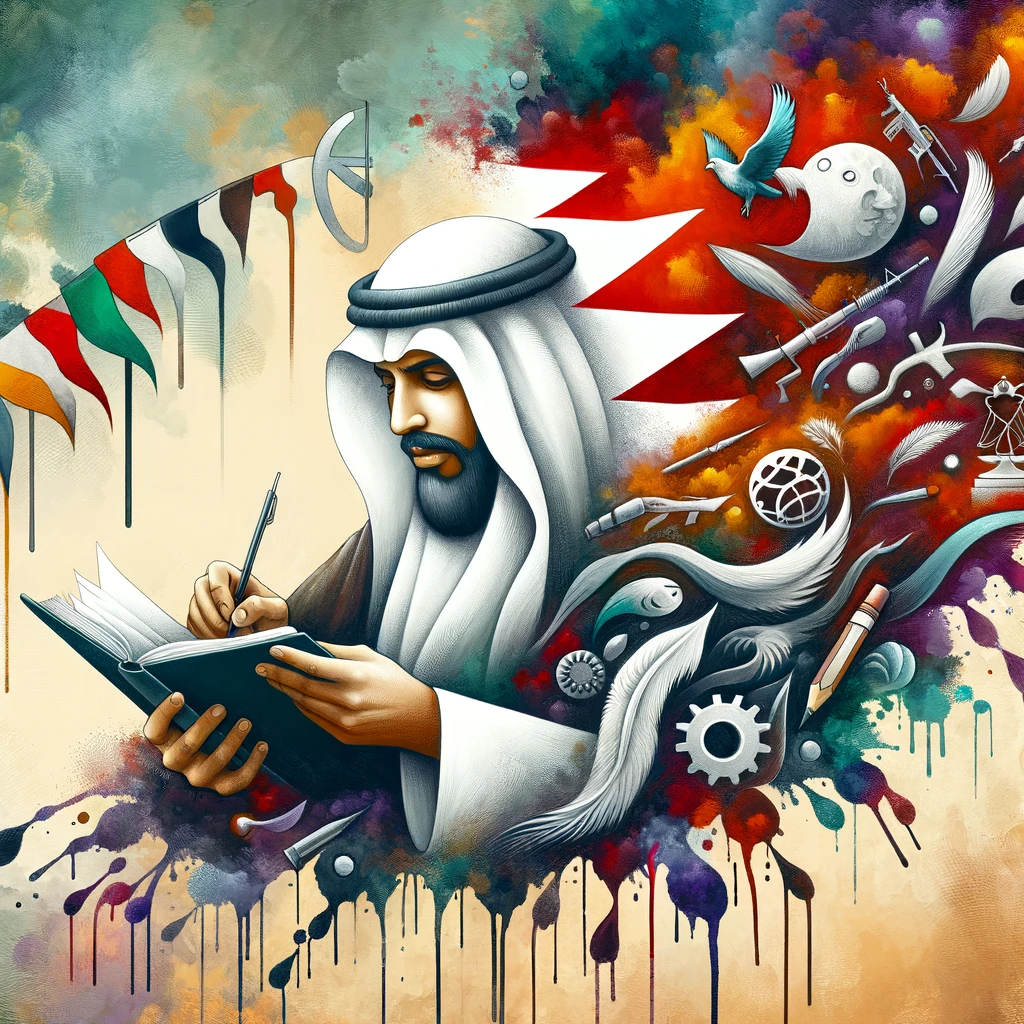
Key Authors and Their Contributions to Bahraini Literature
Qassim Haddad
Qassim Haddad stands as a towering figure in the realm of Bahraini literature, celebrated for his profound impact on Arabic poetry. Born in Bahrain in 1948, Haddad’s self-education in literature led him to challenge and innovate within the traditional confines of Arabic poetry. His seminal work, “Chronicles of Majnun Layla” (1994), reimagines the classic Arabian love story, infusing it with themes of passion, liberty, and existential questing, thereby resonating deeply with contemporary audiences. Haddad’s pioneering spirit also led him to co-found the avant-garde literary magazine “Al-Kateb,” a platform that became instrumental in promoting modern literary movements within the Arab world. His poetry, known for its lyrical intensity and philosophical depth, explores the intersection of personal freedom and societal constraints, making him a critical voice in modern Arabic literature.
Ali Al Jallawi
Ali Al Jallawi, born in 1975, has emerged as a defiant voice in Bahraini literature, navigating through the tumultuous waters of political dissent and exile. His experiences with imprisonment and exile for his outspoken critiques of the government have deeply influenced his literary output. Al Jallawi’s collection, “Poems from Exile,” poignantly captures his reflections on freedom, belonging, and the human spirit’s resilience. His involvement in the “Spring of Culture” festival and the 2011 protests underscored his commitment to leveraging literature as a form of political and social activism, championing the causes of human rights and democratic freedoms through the power of the written word.
Ayat Al-Qurmezi
Ayat Al-Qurmezi became a symbol of resistance and courage during the 2011 Bahraini protests, using her poetry as a tool for activism and social commentary. Her arrest and subsequent international attention highlighted the power of literature as a form of peaceful protest. Al-Qurmezi’s poems, often disseminated through social media platforms, became rallying cries for democracy and human rights, illustrating the significant role of digital media in amplifying dissenting voices. Her work not only reflects the contemporary struggles of Bahraini society but also embodies the global fight for freedom and dignity.
Lulwa Al Mansouri
Lulwa Al Mansouri, through her legal background and literary talent, offers insightful perspectives into the fabric of Bahraini society. Her novel “Scattered Crumbs” (2003) explores the impact of sudden wealth on Bahraini families, weaving together themes of identity, ambition, and the dissonance between tradition and modernity. Al Mansouri’s narrative artistry sheds light on the nuanced challenges faced by women in Bahrain, navigating between roles prescribed by tradition and the aspirations fostered by modern life, making her a vital voice in contemporary Bahraini literature.
Muneera Swar
Muneera Swar, a poet and writer, delves into the complexities of Bahraini identity in the context of globalization and displacement. Her poetry, characterized by its reflective and introspective quality, explores what it means to call a place home in the face of widespread cultural and economic shifts. Swar’s contributions to literature offer a poignant exploration of personal and collective identity, highlighting the intricate dance between holding onto one’s heritage and adapting to the global landscape.
Ebrahim Al Arrayedh
Ebrahim Al Arrayedh’s legacy as a pioneer of modern Bahraini poetry is undeniable. Born in 1908, his extensive body of work over six decades has played a foundational role in shaping the literary culture of Bahrain. Al Arrayedh’s efforts in establishing the first cultural club in Bahrain in the 1930s laid the groundwork for a thriving literary community. His poetry, celebrated for its evocative imagery and emotional depth, traverses themes of love, nationalism, and the natural beauty of Bahrain, securing his place as a cornerstone of Bahraini literary heritage.
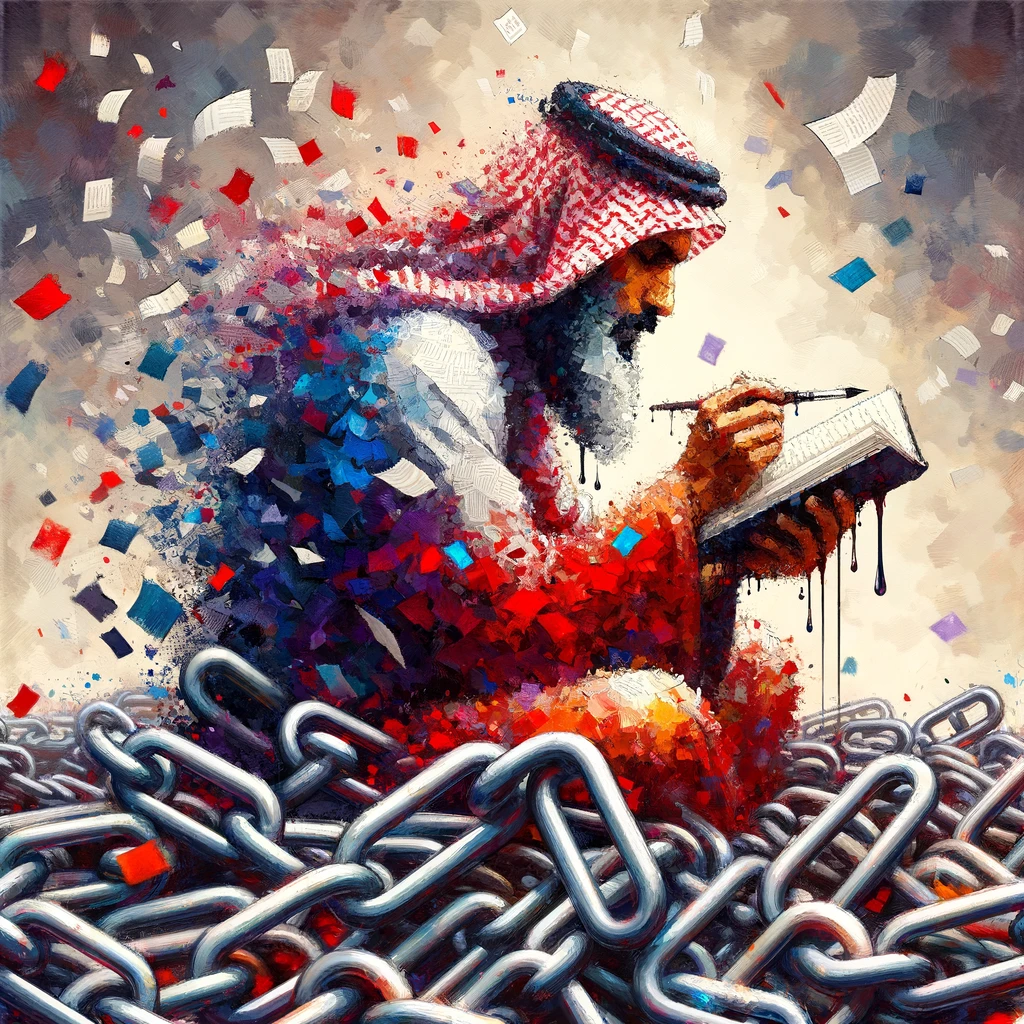
Themes in Bahraini Literature Through the Lens of These Authors
The rich tapestry of Bahraini literature, as woven by authors like Qassim Haddad, Ali Al Jallawi, Ayat Al-Qurmezi, Lulwa Al Mansouri, Muneera Swar, and Ebrahim Al Arrayedh, is marked by recurring themes that reflect the nation’s cultural identity, historical shifts, and contemporary societal challenges. Through their works, these authors navigate complex narratives of identity and nationalism, freedom and political dissent, social issues and human rights, and the delicate balance between tradition and modernity.
Identity and Nationalism
The quest for a distinct Bahraini identity amidst regional and global influences is a central theme. Ebrahim Al Arrayedh’s poetry, with its evocative depictions of the Bahraini landscape and heritage, serves as a lyrical assertion of national identity. His works celebrate the island’s natural beauty and historical significance, fostering a sense of pride and belonging among readers. This theme is echoed in the works of Muneera Swar, whose exploration of displacement and belonging questions the essence of national identity in a globalized world.
Freedom and Political Dissent
The struggle for freedom and the critique of political repression are vividly portrayed in the poetry and writings of Ali Al Jallawi and Ayat Al-Qurmezi. Al Jallawi’s “Poems from Exile” reflect on the personal cost of political activism and the universal yearning for freedom. Similarly, Al-Qurmezi’s courage in using her voice to challenge authority during the 2011 protests has made her poetry emblematic of the fight for democratic freedoms and human rights in Bahrain.
Social Issues and Human Rights
The examination of social justice, gender equality, and human rights features prominently in the works of Lulwa Al Mansouri. Her novel “Scattered Crumbs” not only delves into the socio-economic transformations of Bahraini society but also highlights the gender dynamics at play, offering insights into the challenges and opportunities faced by women in a changing Bahrain.
Tradition vs. Modernity
The tension between preserving cultural heritage and embracing the changes brought about by modernity is a recurrent theme across the works of these authors. Qassim Haddad’s innovative poetry, which breaks from traditional forms to explore contemporary themes, symbolizes the broader cultural dialogue between the old and the new. His work embodies the creative tensions that arise in a society navigating the currents of modernization while striving to hold onto its rich cultural traditions.
These themes are not only reflective of the individual experiences of the authors but also resonate with the broader Bahraini and, indeed, the Arab experience. The literature produced by these figures serves as a mirror to Bahraini society, reflecting its complexities, aspirations, and ongoing dialogues about identity, freedom, and the future.
Contemporary Developments and Challenges in Bahraini Literature
The landscape of Bahraini literature has been significantly shaped by contemporary developments, particularly the advent of digital media and the challenges posed by political and social constraints. These changes have both expanded the reach of Bahraini voices and introduced new hurdles for writers and poets.
The Digital Revolution
The emergence of social media platforms and digital publishing has transformed the way Bahraini literature is created, shared, and consumed. Ayat Al-Qurmezi’s use of social media to disseminate her poetry during the 2011 protests exemplifies this shift. Her ability to reach a global audience, despite the local constraints on traditional media, highlights the powerful role of digital platforms in amplifying dissident voices. This digital landscape has opened up new avenues for writers to bypass censorship, engage with readers directly, and collaborate with a global literary community, thereby democratizing literary expression in unprecedented ways.
Challenges Faced by Authors
Despite the opportunities afforded by the digital age, Bahraini authors continue to face significant challenges. Censorship and the suppression of free expression remain critical issues, as seen in the experiences of Ali Al Jallawi, who faced imprisonment and was forced into exile for his outspoken political views. The struggle against censorship not only impacts the dissemination of literary works but also poses existential threats to authors, who must navigate the fine line between artistic expression and political dissent. The case of Ayat Al-Qurmezi further illustrates the risks involved in using literature as a form of political activism, where the act of writing becomes a courageous but perilous endeavour.
These contemporary developments underscore the dynamic nature of Bahraini literature, as it adapts to and reflects the changing realities of Bahraini society. While the digital revolution offers new possibilities for expression and connection, the enduring challenges of censorship and political repression highlight the resilience and courage of Bahraini writers. Their continued efforts to articulate the complexities of Bahraini identity, critique social injustices, and envision a more open and democratic society through their work, demonstrate the vital role of literature in the ongoing cultural and political conversations in Bahrain.
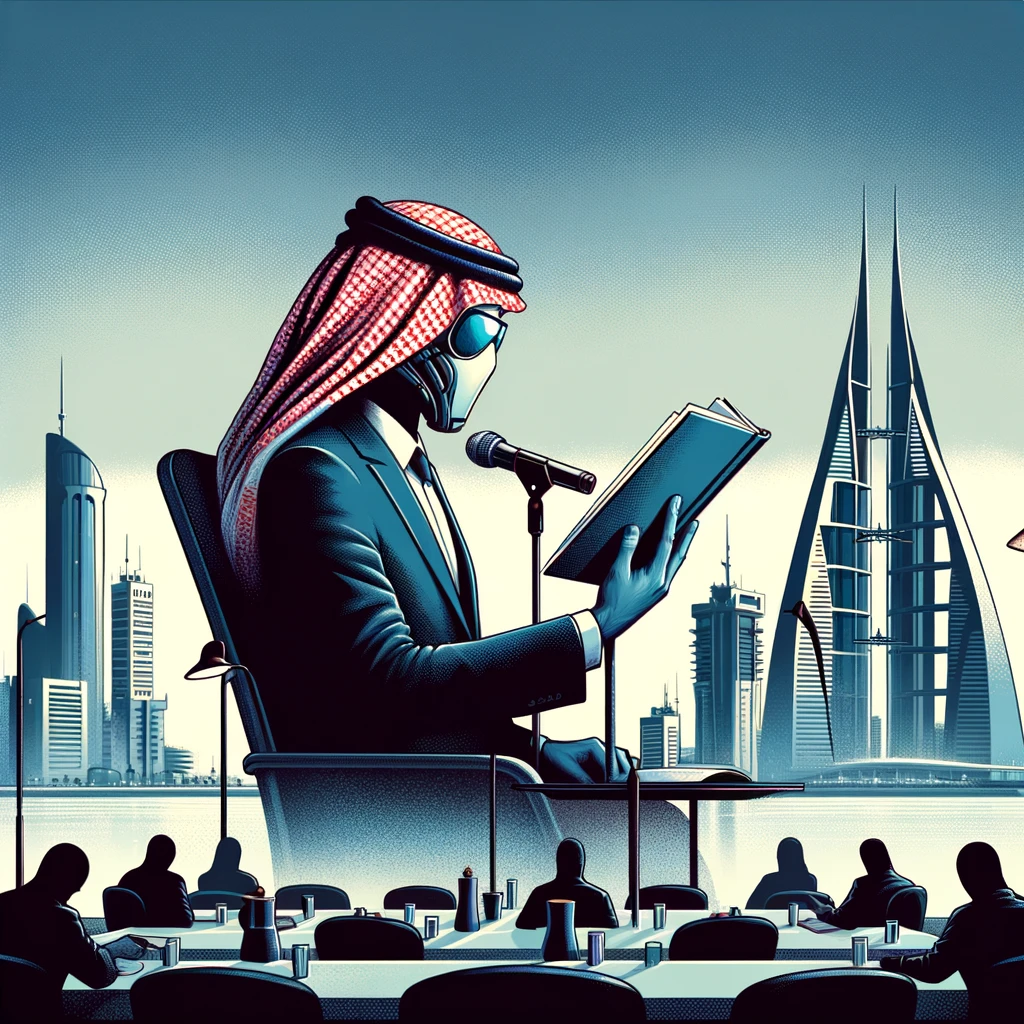
The exploration of Bahraini literature through the lens of key authors reveals a rich narrative of a nation at the crossroads of tradition and modernity. Their collective works, spanning themes of identity, freedom, and societal change, offer profound insights into the heart and soul of Bahraini culture and its enduring struggles and aspirations. As Bahrain continues to navigate its path in the 21st century, the evolving landscape of its literature remains a testament to the resilience, creativity, and spirit of its people.
FAQ
Q: Who is considered a pioneering figure in modern Bahraini poetry?
A: Qassim Haddad is considered a pioneering figure for his innovative approach to Arabic poetry.
Q: What themes are prevalent in Ali Al Jallawi’s work?
A: His work often explores themes of exile, freedom, and human rights.
Q: How did Ayat Al-Qurmezi contribute to Bahraini literature?
A: She used her poetry as a form of resistance during the 2011 protests.
Q: What impact has digital media had on Bahraini literature?
A: It has greatly expanded the reach and influence of Bahraini authors.
Q: What major challenge do Bahraini authors face?
A: They face significant challenges with censorship and freedom of expression.
Q: How does Bahraini literature reflect the tension between tradition and modernity?
A: Through narratives that explore the impact of societal changes and the balance between preserving cultural heritage and embracing modern life.
